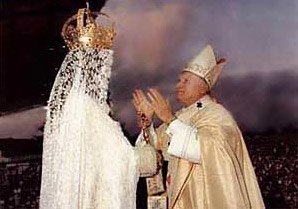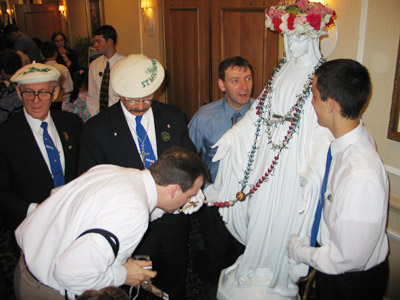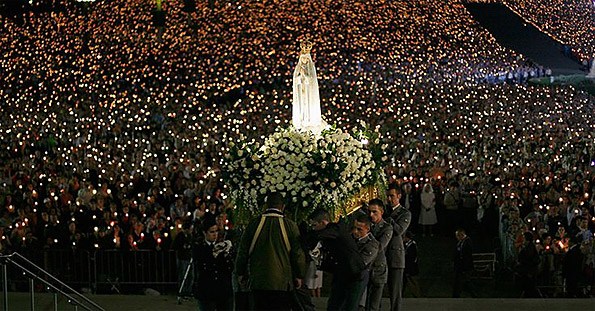
Posted on 02/27/2020 1:31:39 PM PST by ebb tide

ROME (ChurchMilitant.com) - Catholics all over the world have been scandalized by nuns performing a distinctive Hindu ritual during the elevation of the Holy Eucharist at a Mass celebrated by Cdl. Blaise Cupich in Rome.
The "arati" ritual is one of twelve Hindu symbols, rituals and ceremonials approved by the Vatican for the "Indian Rite Mass" and has led to widespread syncretism, liturgical abuse, confusion among the laity and a moratorium on evangelization in India.
A trio of Indian nuns, who had completed their diploma in safeguarding at the Gregorian Pontifical University's Center for Child Protection, performed the "arati" rite at the thanksgiving Mass presided over by Cdl. Cupich of Chicago on Feb. 14.

Nuns offer "arati" while Cdl. Cupich presides at Holy Mass
The "arati" was performed to the chant of a "bhajan" (Indian chorus) with the music of Indian instruments accompanying the singing. At least three other priests are concelebrating alongside Cupich.
In a video clip on Twitter posted approvingly by Sr. Karolin Kuhn SSND, the nuns are seen swaying rhythmically to the music, each waving a ceremonial dish containing joss sticks, flowers and oil lamps, as Cupich and his concelebrant raise the consecrated Host and chalice for the Great Doxology at the culmination of the Eucharistic Prayer.
Almost all of the couple of hundred respondents on the Twitter thread slam the ritual as Hindu, pagan, "not Catholic," an "abomination to God," "diabolically disoriented" and "idolatrous."
No priest from India was publicly willing to make a statement when contacted by Church Militant. However, speaking on condition of anonymity, a priest from North India confirmed that such practices had become "now de rigueur in almost all Indian seminaries, convents [and] religious houses of formation."
"The so-called 'Indian Rite Mass' which received Vatican approval in 1969 is vigorously promoted by the Catholic Bishops Conference of India's (CBCI) National, Biblical, Catechetical and Liturgical Center (NBCLC)," he said.
The theological vision behind the Indian Mass is significant, since it integrates the goal of religious sacrifice in Hinduism into that of Christianity.Tweet
The priest admitted that the "arati" was "an explicit Hindu symbol used exclusively by Hindus," but, he said, "bishops, theologians and other religious would mock him if he or faithful lay Catholics even dared to challenge it as inculturation, and using Hindu forms of worship was now "the 'orthodox' position in the Indian Church's hierarchy," regarded as "an authentic Indian expression of the gospel."
"Arati" is a Hindu liturgical rite in which camphor flames, flowers and joss sticks are offered to the deity by means of a clockwise rotation while standing before an idol. The five camphor lights symbolize the five elements of earth, air, fire, water and the ether, representing the totality of the cosmos in Hindu theology. The ceremonial is also used to welcome an important personality or guest, since in monistic Hinduism the whole of creation is one single principle of divinity.
Sources drew Church Militant's attention to the "arati" rite performed by Indian nuns at Strasbourg Cathedral in September 2018 for the beatification of Mother Alphonse-Marie, a French nun and founder of the Sisters of the Divine Redeemer. The Hindu ritual was again performed during the Great Doxology in the presence of dozens of clergy, with no objection or protest.
Here, the sisters are singing a "bhajan" in Tamil. The words used are steeped in Hindu theology with the refrain repeating the word "Anjali" — an offering to a deity (traditionally from the cupped palms of one's hands).

Catholic priest in Hindu robes performing "arati" to his people
"Here we have a purely Hindu ceremony introduced," writes Victor J. F. Kulanday in his book The Paganized Catholic Church in India. Kulanday cites two authorities on Hinduism explaining the Hindu significance of arati.
Walker's Hindu World points out that the "object of the 'arati' rite is to please the goddess with bright lights and colors and also to counteract the evil eye," he notes.
Further, French Catholic missionary and Sanskrit scholar Abbe J. A. Dubois in Hindu Manners, Customs and Ceremonies notes that "arati" is one of the "commonest religious practices of the Hindus ... performed by married women and courtesans ... to counteract the influence of the evil eye and any ill-effects arising from the jealous and spiteful looks of ill-intentioned persons."
In 1969, the Vatican permitted 12 points of adaptation for celebration of the Mass in India leading to an "Indian Rite" form of the Holy Eucharist. The "arati" is one of the rituals that was approved by the Vatican Congregation for Divine Worship.
The "Indian Rite Mass" uses the "arati" at four points in the liturgy. First, when the priest enters, he is blessed with the person performing the arati tracing three circles around him. The outer circle symbolizes the cosmos, the second circle represents the human community and the third smallest circle stands for the congregation greeting the priest.
Similarly, the priest then takes the "arati" in his hands and — facing the congregation — performs the ritual over the people in three circles.

Nuns offering "arati" at the Doxology in Strasbourg Cathedral
Second, during the Liturgy of the Word, homage is paid to the Bible with a double "arati" of flowers and incense. The "Indian Rite Mass" prescribes verses from the Hindu scripture Brihadaranyaka Upanishad to be chanted while this is taking place. The chant ends with the singing of the sacred Hindu syllable "Om."
Third, at the offertory, the priest makes an "arati" with a tray of eight flowers, which in Hinduism symbolize the eight directions of the universe.
Finally, during the Doxology, there is triple "arati" of flowers, incense and fire.
Indian Catholic priest Fr. Jacob Nangelimalil acknowledges that "the theological vision behind the Indian Mass is significant, since it integrates the goal of religious sacrifice in Hinduism into that of Christianity."
Bishops and theologians promoting the wave of "inculturation" have been caught unawares by the backlash from militant Hindus as well as criticism from Catholic converts from lower-caste Hindu backgrounds.
Hindus are condemning the inculturated liturgies as devious gimmicks designed to convert Hindus to Catholicism, while low-caste Catholic converts accuse the Indian hierarchy of incorporating symbols from Brahmanical Hinduism — which kept lower castes subjugated for millennia before they were liberated by converting to Christianity.
Inculturation has also led to a redefinition of evangelization where the goal is to "make a Hindu a better Hindu" and not to bring him or her to faith in Christ and to membership in the Catholic Church.
Ping
While I do not like the idea of this being performed in India, at least they can claim that it’s something that is a part of their culture. When it’s done at a Mass that Cupich is doing, who has no relationship whatsoever to that culture, it’s just another intended knee to the groin by Cupich.
it fits in well with all the other pagan rites of the Roman Church including pachamama, mariology and works righteousness
Fake nuns.
The anti-Catholic bigotry is strong with this one.
Do you think the veneration of the mother of Jesus Christ is a pagan rite?
No surprise that Blaise Cupich was involved.
It's strong with Satan, also.
The word "mario-LOGY" simply means "the study of Mary" (just like soteriology = the study of salvation, ecclesiology = the study of the the Church, pneumatology = study of the Spirit, missiology = study of the missions.) We do study all these areas.
Perhaps the word you were looking for was "mario-LATRY," which would mean adoration of Mary, that is, wrongly giving her, a creature and handmaid, the supreme worship which is due only to the Supreme Being, God, our Creator and Lord.
Be careful not to confuse these words. "Latria" doesn't mean study ("Logia"), it means adoration. The study of Mary is not the adoration of Mary.
The Church considers "latria" directed to anybody except for God, a grave error: it is the heresy of idolatry.
Thanks for giving me the opportunity to clarify this for our readers.
If it’s an accepted part of the mass in India, I guess I am missing the issue. Is it because they did it outside of India?
In additon to your post:
Latria is reserved for God alone, no others. It is the worships of God, alone.
Hyperdulis is reserved for the Mother of Jesus Christ. It’s veneration, not worship.
Dulia is the veneration of all the saints and angels in Heaven above us. Also not worship.
Pachamama is as much a "pagan rite of the Roman church" as homosexual marriage is a pagan rite of the Lutheran church.
Don't accept it as Lutheran? Great, I don't accept pachamama as Catholic. Want me to respect your view? Try respecting mine.
My church does not officially accept homosexual marriage nor has there been a homosexual marriage in an LCMS church that I am aware of. The day that there is if that congregation is not immediately put outside the LCMS it cease to be my Church. When a Church takes on apostate views and rituals it is up to the laity to decide what to do about it. I will not worship in an apostate a Church. Apparently most Catholics will
While I respect your views, Pachamama has been brought into the altar of the catholic church by your leadership, the same way this Hindu rite has been. You can only make excuses so long then you have to act. I feel for you that the church you grew up in has gone this far down the road of apostasy, it’s not easy to see I’m sure. However that does not remove the responsibility of those in the pew to draw a line and take a stand or leave. I wish you much discernment what is best to do. I think the time is coming when all true Blood bought Christians will be worshipping in home underground Churches again unless the Lord returns soon
As for mariolatry and works righteousness we will never agree but the plain teaching and actions of the RCC speaks for themselves I guess we will continue to disagree on that one.
Yeah, right. And we all know protestants hate Mary with a passion.
Then you know less than you think you do. The only act of worship that Catholics have is the holy Sacrifice of the Mass where we join ourselves to the one sacrifice of Jesus Christ on the Cross where he offers himself to the Father. Can you show any Mass where the sacrifice is made to Mary? No. Catholics worship God alone!
Yeah, right. And we all know protestants hate Mary with a passion.
No....Christians do not hate Mary with a passion. You continue to persist in advancing yet another falsehood. You seem to be wracking them up again this week.
What is condemned though is the idolization of Mary by Roman catholicism.
Maybe not in the Mass....but Roman Catholics make up for it in lots of other places and ways.



Disclaimer: Opinions posted on Free Republic are those of the individual posters and do not necessarily represent the opinion of Free Republic or its management. All materials posted herein are protected by copyright law and the exemption for fair use of copyrighted works.